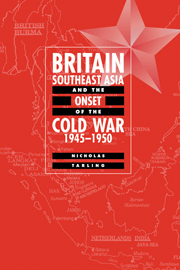Book contents
- Frontmatter
- Contents
- Preface
- List of abbreviations
- Maps
- 1 Wartime Plans for Post-war Southeast Asia, 1942–1945
- 2 Southeast Asia after the Japanese Surrender, 1945–1946
- 3 The Re-establishment of Colonial Régimes in Southeast Asia, 1946
- 4 Concession and Conflict, 1947
- 5 The Impact of Communism, 1948
- 6 Commonwealth and Colombo, 1949–1950
- Personalia
- Notes
- Bibliography
- Index
4 - Concession and Conflict, 1947
Published online by Cambridge University Press: 05 August 2012
- Frontmatter
- Contents
- Preface
- List of abbreviations
- Maps
- 1 Wartime Plans for Post-war Southeast Asia, 1942–1945
- 2 Southeast Asia after the Japanese Surrender, 1945–1946
- 3 The Re-establishment of Colonial Régimes in Southeast Asia, 1946
- 4 Concession and Conflict, 1947
- 5 The Impact of Communism, 1948
- 6 Commonwealth and Colombo, 1949–1950
- Personalia
- Notes
- Bibliography
- Index
Summary
The crises of 1947
The British government's task was to balance the demands for reconstruction at home and those for reconstruction abroad. No clear choice was made between them; none could be made. Subsequent criticism that Britain's priorities were mistaken misses the mark. The British government retained the longstanding view of British governments that the essential basis of Britain's survival and welfare was a thriving economy. But that would not be possible unless it were part of a stable world. Britain must make its contribution to that, too. The crucial issue was indeed a compromise between these commitments, not a choice between them.
The criticism, if due, should be applied, too, in the context of the time. At the end of the Second World War, the Cold War pattern had not emerged. The focus of the Soviet Union was on Europe, but what policy it would pursue could not be ascertained, and US policy was also unclear. The fate of Europe and the fate of the ‘Third world’, as it was later to be called, had still to be decided. Given the limited role of the super-powers, Britain had to take on worldwide reponsibilities. In Europe it contemplated a relationship with France and the other Western states. Overseas, in particular in Southeast Asia, what it sought was a new relationship between Europe and emergent nationalism. Without that it feared an East-West polarisation from which communism would benefit. It was an ambitious programme, but no one else was there to undertake it.
- Type
- Chapter
- Information
- Britain, Southeast Asia and the Onset of the Cold War, 1945–1950 , pp. 185 - 262Publisher: Cambridge University PressPrint publication year: 1998



